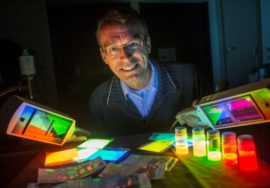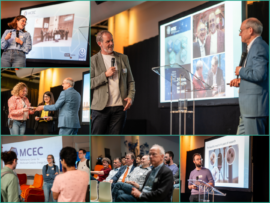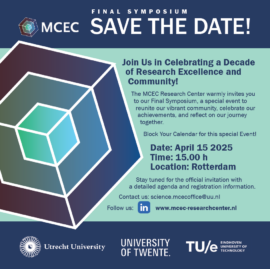 Devaraj van der Meer studied theoretical high energy physics at Leiden University. After working in advertising and high school physics teaching he joined the Institute for Physics Education at the University of Twente where he subsequently realized his passion for physics research on the human scale and obtained his PhD degree in 2004 on the physics of compartmentalized granular gases. He was appointed full professor at the University of Twente in 2012 and is a member of the Physics of Fluids group since 2002. His research interests range from granular physics to fluid mechanics and comprises almost everything in between, where fluids and grains interact. He is fascinated by the often surprising collective effects of many-particle systems and enchanted by the beauty of free-surface flows. His research philosophy is to come to a full understanding of phenomena by combining experimental, numerical and theoretical approaches.
Devaraj van der Meer studied theoretical high energy physics at Leiden University. After working in advertising and high school physics teaching he joined the Institute for Physics Education at the University of Twente where he subsequently realized his passion for physics research on the human scale and obtained his PhD degree in 2004 on the physics of compartmentalized granular gases. He was appointed full professor at the University of Twente in 2012 and is a member of the Physics of Fluids group since 2002. His research interests range from granular physics to fluid mechanics and comprises almost everything in between, where fluids and grains interact. He is fascinated by the often surprising collective effects of many-particle systems and enchanted by the beauty of free-surface flows. His research philosophy is to come to a full understanding of phenomena by combining experimental, numerical and theoretical approaches.
Archives
Prosperetti
Andrea Prosperetti’s work is mostly theoretical and computational. Most of it is devoted to several aspects of multiphase flow: bubble dynamics, numerical simulation of flows with suspended particles (both fully resolved and approximated as points), averaged equations and averaging methods, heat transfer with phase change, acoustics and others. He is the Editor in Chief of the International Journal of Multiphase Flow and member of the U.S. National Academy of Engineering and of the Royal Dutch Academy of Sciences. He permanent appointment is at the University of Houston in the U.S., but he holds a part-time appointment at the University of Twente.
Bruijnincx
Pieter Bruijnincx obtained his Ph.D. degree in Chemistry (2007) from Utrecht University (cum laude, highest distinction) with his doctoral studies focusing on the development of bio-inspired oxidation catalysts. After working as a NWO Rubicon Postdoctoral fellow at the University of Warwick, U.K., on catalytic anticancer drug development, he returned to Utrecht in 2009 to work in the Weckhuysen group as an tenure-track assistant professor (tenured as of 2013) on the catalytic conversion of biomass and renewables. In 2010 and 2013 he received VENI and VIDI grants from the Netherlands Science Foundation (NWO). In 2018 he was appointed Professor of Sustainable Chemistry and Catalysis at the Department of Chemistry, Utrecht University. This new Chair will bridge research into homogeneous and heterogeneous catalysis for turning renewable feedstock, such as biomass, CO2 and waste streams into chemical building blocks.
oxidation catalysts. After working as a NWO Rubicon Postdoctoral fellow at the University of Warwick, U.K., on catalytic anticancer drug development, he returned to Utrecht in 2009 to work in the Weckhuysen group as an tenure-track assistant professor (tenured as of 2013) on the catalytic conversion of biomass and renewables. In 2010 and 2013 he received VENI and VIDI grants from the Netherlands Science Foundation (NWO). In 2018 he was appointed Professor of Sustainable Chemistry and Catalysis at the Department of Chemistry, Utrecht University. This new Chair will bridge research into homogeneous and heterogeneous catalysis for turning renewable feedstock, such as biomass, CO2 and waste streams into chemical building blocks.
His research focuses on route and catalyst development for the valorization of i) primary components of lignocellulosic biomass and 2) biomass-derived platform molecules. With the primary feeds, emphasis is on recalcitrant feeds such as humins and lignin. Platform molecule conversions include highly active bifunctional catalysts for the selective hydrogenation of levulinic acid and the first examples of biomimetic iron-catalyzed oxidative cleavage of lignin derivatives and fatty acids. Other topics include aromatics production from sugars, and the synthesis of butadiene from bioethanol. The research, financed by NWO, STW, EU and by industrial partners, is carried as part of national (e.g. public private partnerships such as Catchbio, BPM, etc), international (Marie Curie ITN, COST, etc) and industrial collaborations. The projects involve the development of mostly heterogeneous catalysts, but also homogeneous transition metal-based catalysts and organocatalysts. We aim to gain fundamental understanding of the catalytic process, i.e. the elucidation of structure-activity relationships, to study catalyst stability and deactivation and to apply (in situ) spectroscopy to study mechanistic aspects of the reaction.
Sint Annaland
The mission of the chemical process intensification group is the education, research, development and implementation of novel integrated multi-phase reactor concepts for energy, bio-based and chemical applications with the objective to reduce the environmental impact and improve the resource and energy efficiency of industrial processes by using our strong, unique and continuously developing combination of modeling, experimental and technological competences. The main research objective is to generate and transfer fundamental knowledge on how to intensify processes by integrating unit operations and to develop and demonstrate novel integrated multi-phase reactor concepts with a major improvement in energy and resource efficiency and a reduced environmental impact. Our approach consists of a combination of state-of-the-art numerical models, advanced (non-invasive) experimental techniques and experimental demonstration of novel multi-functional reactor concepts (including proof-of-concept). The most important research themes can be categorized in i) integration of reaction and separation, where we focus in particular on (high-temperature) catalytic membrane reactors, chemical looping and sorption enhanced processes; ii) heat integration, and especially via dynamic process operation such as in reverse flow reactors, the coupling of endothermic and exothermic reactions, and exploitation of heat of evaporation for cooling such as in gas-phase polymerization reactors in condensed mode operation.
Toschi
Meijerink
 Andries Meijerink received his MSc and PhD degree in Chemistry at Utrecht University. After a post-doc in Madison (University of Wisconsin) he returned to Utrecht in 1991. In 1996, at the age of 32, he was appointed at the chair of Solid State Chemistry in the Debye Institute of Utrecht University where he leads an active group in the field of luminescence spectroscopy of quantum dots and lanthanide ions.
Andries Meijerink received his MSc and PhD degree in Chemistry at Utrecht University. After a post-doc in Madison (University of Wisconsin) he returned to Utrecht in 1991. In 1996, at the age of 32, he was appointed at the chair of Solid State Chemistry in the Debye Institute of Utrecht University where he leads an active group in the field of luminescence spectroscopy of quantum dots and lanthanide ions.
In the field of lanthanide ions his work involves fundamental research on the energy level structure of both 4fn and 4fn-15d states and finding new concepts related to applications in solar cells, LEDs and scintillators. His research on quantum dots is aimed at unraveling the influence of quantum confinement and surface effects on the electronic structure and exciton dynamics of quantum dots through optical spectroscopy and using the quantum dots as labels in bio-imaging. Research on luminescence of doped nanocrystals integrates the two themes. Recent work has resulted in a better fundamental understanding of photonic effects on optical processes, insight in energy transfer processes and application of luminescent nanocrystals as probes. The work has resulted in over 350 publications and 10 patents and is highly cited. For his research Andries Meijerink received several awards, including the Shell Incentive Award (1995), the Gold Medal of the Royal Dutch Chemical Society (1999) and the Centennial Award for Luminescence and Display Materials from the Electrochemical Society (2002). In 2009 he was elected into the Royal Dutch Academy of Sciences.

Zhang
Xuehua Zhang completed her PhD in Biomedical Engineering at Shanghai Jiao Tong University at the end of 2004. Her PhD thesis was on nanobubbles at solid-water interfaces. After her PhD, she first worked as an Endeavour Research Fellow at the Australian National University and then at University of Melbourne. From 2009 on, she led her own research group, working on nanobubbles and nanodroplets.
In 2012 she spent her sabbatical at the University of Twente. From July 2014 on she joined the staff of RMIT University in Melbourne as an Associate Professor and in October 2014 she was also appointed as a part time Professor at University of Twente. She moved to Canada and joined the Department of Chemical and Materials Engineering in University of Alberta as a Professor in September 2017.
Her research area is colloid and interface science. Specifically, her research concerns nanoscale bubbles and droplets on a solid surface immersed in a liquid environment, their formation, physical properties, stability, and effects on the interfacial phenomena on or near the solid surface.
Verzicco
Roberto Verzicco completed his PhD in Aerospace Engineering in 1994 at the University of Rome `La Sapienza’ where he got a position as Assitant Professor. He became Associate Professor in Fluid Mechanics in 1998 at Politecnico di Bari where he became Full Professor in 2003. Since 2007 he is Professor of Fluid Mechanics at the University of Rome `Tor Vergata’ and since 2010 Part Time Professor at the University of Twente in the group Physics of Fluids.
His research area is “Numerical simulation of complex flows and turbulence”. Specifically his research concerns thermally driven turbulence (Rayleigh-Benard flows), shear driven turbulence (Taylor-Couette flows) and biomedical flows (fows in heart valves, coronary arteries and aorta).
Odijk
Mathieu Odijk is recently appointed as assistant professor starting a tenure track on Micro- and Nanodevices for Chemical Analysis in 2015. He finished his MsC in electrical engineering in 2007, followed by a PhD on the topic of miniaturized electrochemical cells for drug screening in 2011. He has been a visiting scientist at EPFL (prof. Girault, 2012), the Wyss institute at Harvard (2013), and MIT (prof. Jensen, 2014). His expertise is in microfluidics, electrochemistry and microfabrication. He has a ‘teachers heart’, shown by pushing new teaching developments and as his role as expert in the development of a high-school (NLT) module Lab-on-Chip. He was nominated as one of 9 technological top talents by STW in 2010, and awarded a VENI grant in 2014.
The theme of microdevices for chemical analysis aims at engineering novel devices to measure chemical quantities, pushing boundaries in applications to explore unknown territory. Often, this relates to faster, or better spatially resolved measurements at lower concentrations in small volumes. Micro- and nanofabrication techniques are used to enhance electrochemical, optical or mass spectrometric readout. The ultimate goal is to create new, yet robust tools for routine use in the lab or point-of-care applications.
Gac
 Séverine Le Gac is currently Associate Professor and Director for the research programme Nanomedicine at MESA+. She received her Engineer degree in chemistry (specialization biology) from the ESPCI (Paris, France) and her DEA (MSc equivalent; interface biology/chemistry) from the MNHN (Paris, France) in 2000. In 2004, she obtained her PhD degree cum laude in life sciences from the USTL (Lille, France) for the development of microfluidic systems for proteomic analysis by mass spectrometry, and for this work she was attributed the PhD prize of the French Society for Mass Spectrometry in 2005. Since 2005 she has been working at MESA+, University of Twente, as a post-doctoral fellow for 3 years, and between 2008 and 2013 she was on a tenure-track position at BIOS, Lab-on-a-Chip Group (assistant professor). Since June 2013, she has been associate professor at MESA+, and in 2012, she was chosen to lead the strategic research orientation “Nanomedicine” in the same institute.
Séverine Le Gac is currently Associate Professor and Director for the research programme Nanomedicine at MESA+. She received her Engineer degree in chemistry (specialization biology) from the ESPCI (Paris, France) and her DEA (MSc equivalent; interface biology/chemistry) from the MNHN (Paris, France) in 2000. In 2004, she obtained her PhD degree cum laude in life sciences from the USTL (Lille, France) for the development of microfluidic systems for proteomic analysis by mass spectrometry, and for this work she was attributed the PhD prize of the French Society for Mass Spectrometry in 2005. Since 2005 she has been working at MESA+, University of Twente, as a post-doctoral fellow for 3 years, and between 2008 and 2013 she was on a tenure-track position at BIOS, Lab-on-a-Chip Group (assistant professor). Since June 2013, she has been associate professor at MESA+, and in 2012, she was chosen to lead the strategic research orientation “Nanomedicine” in the same institute.

